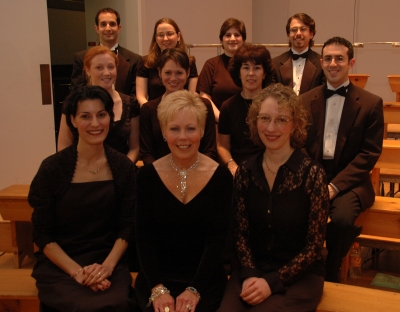Return to Gwyneth Walker Music Catalog
View a video of a performance of this work by the Harvard University Choir, Edward Elwyn Jones, conductor.
Download an an MP3 file of the first movement of this work performed by the Harvard University Choir, Edward Elwyn Jones, conductor.
Download an an MP3 file of the second movement of this work.
Download an an MP3 file of the third movement of this work.
Download an an MP3 file of the fourth movement of this work.
Download an an MP3 file of the first movement of this work performed by the Greater Middletown Chorale, Joseph D'Eugenio, conductor.
Download an an MP3 file of the second movement of this work.
Download an an MP3 file of the third movement of this work.
Download an an MP3 file of the fourth movement of this work.
Download an an MP3 file of the first movement of this work performed by the Fairfield University Glee Club, Carole Ann Maxwell, conductor.
Download an an MP3 file of the second movement of this work.
Download an an MP3 file of the third movement of this work.
Download an an MP3 file of the fourth movement of this work.
Download an MP3 file of a performance of the
Download an MP3 file of a performance of the fourth movement of this work, "There is a Way to Glory" (SATB and orchestra), by the Western Colorado Chorale and the Grand Junction Symphony orchestra, Monte Atkinson, conductor.
Download an MP3 file of a performance of the fourth movement of this work, "There is a Way to Glory" (SATB and orchestra), by the Plymouth State College New England Choral Festival, Dan Perkins, conductor.
Download a PDF file of the choral score of this composition. For perusal only -- not printable.
Download a PDF file of the orchestra score of the SATB version of "There is a Way to Glory." For perusal only -- not printable.
Download a PDF file of the choral score of the TTBB version of "There is a Way to Glory." For perusal only -- not printable.
Download a PDF file of the orchestra score of the TTBB version of "There is a Way to Glory." For perusal only -- not printable.
(Photograph of members of the Fairfield University Glee Club with director Carole Ann Maxwell.)

Commissioned by the Center for Catholic Studies at Fairfield University in celebration of the 60th Anniversary Season of the Fairfield University Glee Club. Premiered by the Fairfield University Glee Club, Dr. Carole Ann Maxwell, conductor, April 14, 2007, Fairfield, CT
The texts for these four songs are taken from a series of "Freedom Songs" which Thomas Merton wrote in 1966. These poems were created in response to a special request in connection with the Christian non-violent movement for Civil Rights. Thus, faith, equality and peace are the unifying themes in the songs.
The ordering of the texts and the creation of the musical settings have been formed with the intent of presenting a growth in the intensity of the message. From the quiet "Evening Prayer" to the powerful "There is a Way," the songs span a variety of imagery and musical language. The prayer, the voice of faith and the affirmation of equality grow ever more insistent.
Images central to the various songs are:
"Evening Prayer" - the prayer rising "sweet as incense smoke"
"I Have Called You" - forceful, the voice of the Lord speaking "I have called you by your name. You belong to me."
"Be my Defender" - growth in intensity from the quiet supplication "Lord, be my Defender" to the dramatic "Kneel and tremble in the night"
"There is a Way" - a triumphant march to glory!
Lines from the poem "There is a Way" encompass the inspiration behind the entire set of Songs to the Lord of Peace.
There is a way to glory.
Love is this way to glory.
Riding on to Sion where the Lord of Peace rules in glory.
[Composer's note: another musical setting of one of Thomas Merton's "Freedom Songs" is Tell The Earth to Shake (ECS #6421). This song might be programmed along with the Songs to the Lord of Peace, although it is suggested it be placed apart from the four-movement set in the program order.]
Notes by the composer